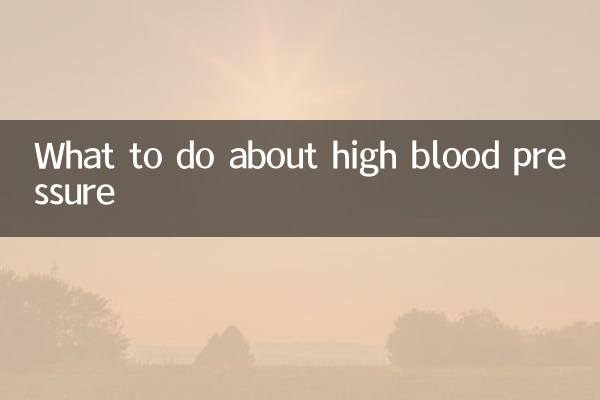What to do about high blood pressure
Hypertension is a common chronic disease, and if left uncontrolled for a long time, it may lead to serious consequences such as cardiovascular and cerebrovascular diseases. In recent years, the incidence of hypertension has increased year by year and has become a health issue of global concern. This article will combine the hot topics and hot content on the Internet in the past 10 days to provide you with suggestions on the prevention and treatment of hypertension, and present relevant data in a structured way.
1. The dangers of high blood pressure

Hypertension is known as the "silent killer" because its early symptoms are not obvious and can easily be ignored. Long-term high blood pressure can cause damage to the heart, brain, kidneys and other organs, and increase the risk of myocardial infarction, stroke and other diseases. The following are the main dangers of high blood pressure:
| Hazardous parts | specific impact |
|---|---|
| heart | Cause myocardial hypertrophy, heart failure, coronary heart disease, etc. |
| brain | Increase the risk of cerebral hemorrhage and cerebral infarction |
| kidney | Causing renal failure and uremia |
| Blood vessel | Accelerate arteriosclerosis and cause peripheral vascular disease |
2. Diagnostic criteria for hypertension
According to the latest standards of the World Health Organization (WHO), the diagnosis of hypertension is divided into the following levels:
| Blood pressure classification | Systolic blood pressure (mmHg) | Diastolic blood pressure (mmHg) |
|---|---|---|
| normal blood pressure | <120 | <80 |
| normal high value | 120-139 | 80-89 |
| Hypertension grade 1 | 140-159 | 90-99 |
| Hypertension grade 2 | ≥160 | ≥100 |
3. Prevention and treatment measures for high blood pressure
The prevention and treatment of hypertension requires both lifestyle and drug treatment. The following are the recommendations for the prevention and treatment of high blood pressure that have been hotly discussed across the Internet in the past 10 days:
1. Lifestyle adjustments
| Adjust direction | Specific measures |
|---|---|
| diet | Reduce salt intake (≤5g per day), eat more fruits and vegetables, and limit high-fat foods |
| sports | At least 150 minutes of moderate-intensity exercise (such as brisk walking, swimming) per week |
| weight | BMI is controlled between 18.5-24.9, waist circumference <90cm for men and <85cm for women |
| Quit smoking and limit alcohol | Quit smoking completely. Drinking alcohol ≤25g/day for men and ≤15g/day for women. |
| psychology | Maintain a good attitude and avoid long-term stress and anxiety |
2. Medication
For patients whose blood pressure still does not meet the target after lifestyle adjustments, they need to use antihypertensive drugs under the guidance of a doctor. The following are common categories of antihypertensive drugs:
| drug type | Representative medicine | Applicable people |
|---|---|---|
| diuretics | Hydrochlorothiazide, indapamide | Senile hypertension, isolated systolic hypertension |
| ACEI | Captopril, enalapril | Patients with diabetes and heart failure |
| ARB | Losartan, Valsartan | ACEI intolerance patients |
| CCB | Amlodipine, nifedipine | Senile hypertension, isolated systolic hypertension |
| beta blockers | Metoprolol, Bisoprolol | Patients with coronary heart disease and tachyarrhythmia |
4. Monitoring and management of hypertension
Patients with hypertension need to monitor their blood pressure regularly and keep records. The following are recommendations for blood pressure monitoring:
| Monitoring frequency | Applicable situations |
|---|---|
| 2-3 times a week | People with good blood pressure control |
| 1-2 times a day | Those who are newly diagnosed with hypertension or whose treatment plan is adjusted |
| 5-7 times a week | Those whose blood pressure fluctuates greatly or does not meet the standard |
5. Common misunderstandings about hypertension
In the process of preventing and treating hypertension, there are some common misunderstandings that need to be avoided:
1.Myth 1: If you don’t have symptoms, you don’t need treatment.- Hypertension may have no obvious symptoms in the early stages, but the harm is still there.
2.Misunderstanding 2: Medication can be stopped once blood pressure is normal- Stopping medication without permission may cause blood pressure to rebound, so medication should be adjusted under the guidance of a doctor.
3.Misunderstanding 3: Antihypertensive drugs will cause dependence- Antihypertensive drugs do not cause dependence, but they require long-term use to control blood pressure.
4.Myth 4: Health products can replace antihypertensive drugs- Health supplements cannot replace regular drug treatment.
6. Summary
Hypertension is a preventable and controllable chronic disease. The key lies in early detection, early treatment and long-term management. Through a healthy lifestyle, standardized medication and regular blood pressure monitoring, most patients with hypertension can control their blood pressure at ideal levels and reduce the occurrence of complications. If you or a family member has high blood pressure, it is recommended to seek medical treatment promptly and develop a personalized treatment plan under the guidance of a professional doctor.

check the details

check the details